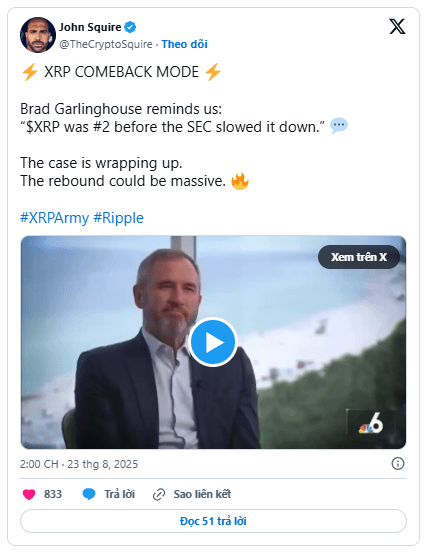John Squire's recent post on X includes a clip of Ripple CEO Brad Garlinghouse, reminding us strongly:
"XRP used to be second before the SEC slowed it down." In the video, Garlinghouse explains, "People forget that... before the SEC intervened in the cryptocurrency market, XRP was the second most valuable digital asset after... ETH... then the SEC intervened... and then they sued Ripple and XRP dropped in value."
Squire's post highlights what many in the XRP community have long argued—that regulatory intervention, rather than market fundamentals, has derailed XRP's trajectory.

Ripple-SEC Case Concluded
The timing of Garlinghouse's comments is notable, as it comes just as the long-running legal battle with the U.S. Securities and Exchange Commission (SEC) has officially concluded. On August 7, 2025, Ripple and the SEC jointly withdrew their appeal to the Second Circuit Court of Appeals.
That move marks the official end of the appellate procedure, upholding the previous rulings of Judge Analisa Torres and closing nearly five years of litigation.
On August 22, the Second Circuit Court of Appeals approved the joint dismissal, confirming that the appeals of both parties had been dismissed. With a lengthy one-page order signed by appellate court clerk Catherine O'Hagan Wolfe, the case has been sealed as 'Ordered', officially closing it. The cryptocurrency industry sees this as the most significant regulatory resolution since the SEC began its campaign against Ripple in 2020.
What's Left...
Although the case has closed, previous rulings of the district court remain in effect. Ripple must pay a civil penalty of $125 million, and the ban on certain organizational sales remains in effect.
Importantly, Judge Torres's ruling from July 2023 remains intact: Selling XRP on the secondary market on exchanges does not constitute a securities transaction, while the organizational sales violated securities laws.
This outcome ensures transparency for daily traders and exchanges, ensuring that XRP is not classified as a security in the open market. At the same time, it also reinforces compliance regarding Ripple's direct sales to organizations.
Market Significance
With the legal uncertainties finally resolved, XRP reacted positively. The price of this token immediately surged on major exchanges, with an increase of 4-13% within just a few hours after the court's ruling. Analysts note that this resolution could pave the way for relisting, bolstering institutional confidence and the potential for inclusion in upcoming financial products like ETFs.
This ruling establishes an important precedent in U.S. regulations, clarifying that while the sale of tokens by organizations may be considered securities, trading cryptocurrencies on the secondary market like XRP is not. This distinction is likely to have far-reaching implications for the entire digital asset industry.
Conclusion
John Squire's repost of Garlinghouse's statement is even more compelling at this moment. XRP was once a close competitor to Ethereum in market capitalization, but its decline was due to legal pressures, not a lack of utility or demand.
After the SEC lawsuit has finally closed, Ripple can redirect its focus to adoption, partnerships, and cross-border payment solutions. Whether XRP can regain its former position remains to be seen, but the conclusion of this litigation will pave the way for the comeback that Garlinghouse describes as a long-awaited return.


